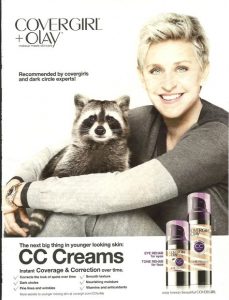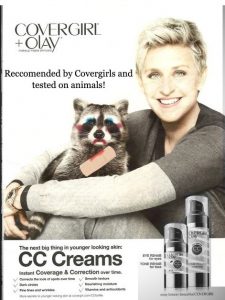Original Ad

The ad that I have chosen to culture-jam shows an image of Ellen DeGeneres holding a racoon in which a cosmetic product called a CC-cream is being advertised in a magazine advert from 2013. This is an advertisement for the brand Covergirl, which is a brand that tested the quality of their cosmetic products on animals during the release of the advert in 2013, a practice often accompanied with abuse and neglect towards the animals being tested on.
Ironically, the ad refers to the raccoon as a “dark circle expert” who hence approves of the product, despite the fact that Covergirl in reality tested on animals. Therefore, the issue in this advert lies in the ironic use of animals to push cosmetic products despite the fact that the product’s manufacturing harms animals in itself.
The raccoon in the original ad plays a primary role to contrast with the models face in order to promote the cc-cream, where the raccoon illustrates dark circles while Ellen has no prominent dark circles on her face. However, one can argue that a secondary purpose of the raccoon is to provide an element of adorability. The raccoon helps draw people to the advert, as many cute smiling animals do, in order to gauge the attention of those flipping through the magazine. In order to successfully use this advert in culture jamming, it is important to keep these key elements of the ad in mind. What draws the eye to the image is the cute animal, and therefore to directly contradict the advert and outline that Covergirl in fact did test on animals at the time, one should focus on keeping the animal in the image and addressing the issue of animal testing directly through alterations made to the original ad itself.
Jammed Ad

The jammed advert intends to instead draw the viewers eye to the raccoon, and therefore highlight the issue regarding Covergirl’s animal testing. The main alteration involves covering the raccoon with cosmetic products and a band-aid, suggesting animals are harmed in the making of Covergirl cosmetic products – although raccoons may not be specifically tested on. Also, while in the original ad the cc-cream is in color while the raccoon is in black and white, in the jammed version the cc-cream is in black and white while the raccoon is in color. This stylistic decision leads to those who view the ad being drawn to the issues regarding the raccoon and hence the animal testing rather than drawing the eye to the cc-cream as initially intended by Covergirl.
The alterations reveal that although Covergirl may try to come across as “animal-friendly” by including content looking animals in their adverts, they were in fact testing on animals at the time the ad was released, and therefore the focus of the ad is shifted to reveal the ethical issues regarding animal testing. The jammed ad intends to invoke feelings of disapprobation towards the company, since drawing light on the raccoon leads to one becoming aware of animal abuse issues of the brand and how animal testing can be cruel and abusive.
Also, the idea of jamming an ad which originally contained an animal may bring an aspect of perspective, encouraging people to think critically of the adverts that they typically see. Simply because the original ad contained a happy looking animal flagged as a supporter of a product has no real meaning regarding Covergirl’s stance on ethical animal treatment, as the jammed ad shows the reality behind how Covergirl truly respected animals at the time.
Works Cited
COVERGIRL. Cosmopolitan, 2013, p. 4
Jones, Charisse. “It’s Official: CoverGirl Cosmetics Are Cruelty Free, Meaning There’s No Animal Testing.” USA Today, Gannett Satellite Information Network, 5 Nov. 2018, www.usatoday.com/story/money/2018/11/05/covergirl-certified-cruelty-free-meaning-no-animal-testing/1860545002/.
Kim. “What CoverGirl Does to Animals Will Break Your Heart.” peta2, 13 Jan. 2017, www.peta2.com/vegan-life/covergirl-animal-testing/.